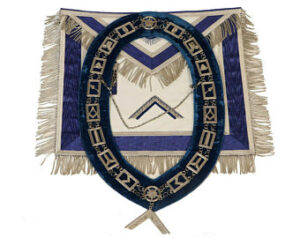
Freemasonry uses what appears to be a foreign language. The terminology is based on ancient traditions. The different officer positions in a local lodge are a good representation.
Each masonic lodge has several different officers that are responsible for the operation of the organization. Some of the positions are required, while others are optional. Officers are assigned custom aprons and “jewels”. Jewels are not precious stones, but instead insignia worn by the officers to indicate their positions. Additionally, some lodges have “progressive lines”, while others do not. A progressive line of officers indicates that someone who wants to be the Worshipful Master of a lodge needs to prove their dedication to the lodge by filling other officer positions beforehand. Whether or not a particular lodge has a progressive line is the decision of that lodge. It often depends on the vitality of the lodge on the interest of their membership.
Each lodge must have the following officer positions:
– Worshipful Master (highest honor a lodge can bestow, like president of lodge)
– Senior and Junior Wardens (responsible for operation of lodge, like Vice Presidents of a lodge)
– Senior and Junior Deacons (assist the wardens and worshipful master in the lodge)
– Secretary (records meeting minutes, communicates with lodge membership and Grand Lodge)
– Treasurer (keeps financial accounts, collects dues and pays expenses)
– Tyler (guards the outside of the lodge doors and announces visitors)
The following officer positions are optional, but some or more common than others:
– Senior and Junior Stewards (assist the deacons, in Texas they run the kitchen)
– Marshall (responsible for lodge etiquette, procedures, and leads the lodge in flag ceremonies)
– Master of Ceremony (prepares candidates before degrees)
– Musician (provides musical accompaniment during lodge proceedings)
– Chaplain (leads lodge in prayer and says grace at dinners)
– Education (responsible for the continued masonic education of the membership)
Additionally, lodges commonly organize several committees that are used to address specific purposes. Some common ones are:
– Scholarships
– Charity
– Widows and Orphans
– Building Maintenance
– Festiveboards (Special Events)
– Social Media / Communications